THE WORLD of
ORTHODOX
JUDAISM
THE WORLD of
ORTHODOX
JUDAISM
ELI W. SCHLOSSBERG

A JASON ARONSON BOOK
ROWMAN & LITTLEFIELD PUBLISHERS, INC.
Published in the United States of America
by Rowman & Littlefield Publishers, Inc.
A wholly owned subsidiary of The Rowman & Littlefield Publishing Group, Inc.
4501 Forbes Boulevard, Suite 200, Lanham, Maryland 20706
www.rowmanlittlefield.com
PO Box 317
Oxford
OX2 9RU, UK
Copyright 1996 by Eli W. Schlossberg
First Rowman & Littlefield edition 2004
All rights reserved. No part of this publication may be reproduced, stored in a retrieval system, or transmitted in any form or by any means, electronic, mechanical, photocopying, recording, or otherwise, without the prior permission of the publisher.
British Library Cataloguing in Publication Information Available
Library of Congress Cataloging-in-Publication Data
Schlossberg, Eli W.
The world of Orthodox Judaism / Eli W. Schlossberg.
p. cm.
Includes index.
ISBN 0-7657-5955-1 (alk. paper)
1. Orthodox Judaism. 2. JewsDietary laws. I. Title.
BM570.S35 1997
296.832dc20
96-41189
Printed in the United States of America
 The paper used in this publication meets the minimum requirements of American National Standard for Information SciencesPermanence of Paper for Printed Library Materials, ANSI/NISO Z39.48-1992.
The paper used in this publication meets the minimum requirements of American National Standard for Information SciencesPermanence of Paper for Printed Library Materials, ANSI/NISO Z39.48-1992.
To
my father
Acknowledgments
This book is written in honor of my dad, Fred A. Schlossberg. One of the worlds finest fathers, Dad was the first to teach me about our beautiful religious heritage, and today he continues to inspire me by example. A deeply religious Orthodox Jew, he serves as a role model for me and for every Orthodox Jewish businessman.
Although he is a consummate entrepreneur and executive, Dad modestly regards himself simply as a salesman. It is he who schooled me in my field of expertise, the specialty gourmet food business. Dad arrived in America in 1938, and since entering the food industry in 1942, he has been buying and selling imported gourmet specialties. To me, he is the worlds best salesman. Over the past 54 years, together with my wonderful mom and enterprising grandmother, he built the family business. He continues selling fine foods today, calling regularly on accounts he has been servicing for decades.
Each day I thank God for giving me such marvelous parents, who provided me with a wonderful upbringing. I attribute any success that I may encounter in life to the exceptional educational opportunities my parents provided for me and to the love they continue to bestow on me and my family each and every day.
Contents
To the Reader
If you work with an Orthodox Jew or live near an Orthodox Jewish neighborhood, you have probably noticed that observant Jews seem to act in some unusual ways. If you have not had the opportunity to ask your Orthodox employees, coworkers, friends, or neighbors why it is they do those seemingly strange thingsor you have been too polite to askthis booklet is for you. I hope it will answer some of your questions about Orthodox Jews, their traditions, and the lifestyle they follow.
Portrait of an
Orthodox Jew
One of your coworkerslets call him Berniewears a skullcap. You sometimes see him sitting in the company cafeteria moving his lips after finishing his lunch. Occasionally, you see him facing the wall in his office, eyes closed, swaying back and forth. When the whole office goes to a fancy restaurant for lunch, he may eat in the office, or if he comes along, he only orders a soda, an iced tea, or perhaps a fresh fruit cup or a plain salad with no dressing. Strangely, his rotund shape suggests that he cant really be on a diet. On Friday mornings in the winter, he shows up at the office early and leaves an hour-and-a-half before anybody else, but in the summer months, when most people leave early on Friday, he stays late. You might think that Bernie is a little strange, but he seems quite normal when you talk to him.
This strange behavior is because Bernie, like me, is an Orthodox Jew. He doesnt wear his skullcap to keep his When he stands and sways in his office, hes not practicing calisthenicshes praying. Hes not eating the same lunch as everyone else in the company because its not kosher. He leaves early on Fridays in the winter because the Sabbath begins early then, and he must get home in time to observe that holy day. However, during the long summer days, when the Sabbath starts later, he is able to stay and work late.
Your conversations with Bernie show that he is very worldly. He is up-to-date on current events and sports. His work is thoroughly professional, and he is a well-educated and cultured person. He is different in that in his daily life he demonstrates that his ultimate values are belief in God and subservience to the laws of the Torah, which is the supreme guiding force in all of his actions.
One day a week, from sunset on Friday to Saturday night, he withdraws from the world of work. He enters totally into a different world that is equally real to him: the spiritual world of the holy Sabbath, with its own set of strict laws and customs. He devotes a major part of his time and resources to passing his values and beliefs on to his children. He educates them in the same tradition he follows, training them in the importance of respect for elders and for their fellow man. By passing on this way of life, he hopes to forge one more link in a chain of tradition that goes back thousands of years.
In the following chapters, I have tried to answer many of the most-common questions people have about Orthodox Judaism and its practices. I begin with an account of the way the Sabbath, holidays, and family milestones are observed, then continue with a summary of the kosher dietary laws, and conclude with a discussion of some differing approaches within the world of Orthodox Judaism. I have attempted to explain in simple terms the principles behind many of its practices, the beliefs they illustrate, and how they affect the everyday life of Orthodox Jews.
When you find an unfamiliar term, consult the glossary beginning on p. 91.
Orthodox Jews often do not write out the Divine name in full in order not to transgress the commandment Thou shalt not take the Lords name in vain. The spellings in this book are the publishers choice.
The 613 commandments written in the Five Books of Moses, as explained and elaborated by the traditional Oral Law.
What Is
an Orthodox Jew?
Every child born to a Jewish mother is automatically Jewish, regardless of his or her fathers religious status. A non-Jew may convert to Judaism by persuading an Orthodox rabbi of his or her sincere intent to accept the laws of Judaism and by following the conversion procedure detailed in the Code of Jewish Law. Converts who have followed this route, which involves a thorough Jewish education and many months of intensive training, are universally accepted as Jewish.
All Jews are expected to follow the laws of the Torah, the 613 commandments written in The Five Books of Moses, as explained and elaborated in detail by the traditional Oral Law taught by the rabbis of the Talmud and later. As in any religion, there are some individuals who are more observant and some who are less observant. In general terms, the degree of attachment to Torah traditions is indicated by the category of affiliation to religious groupings known as
Next page

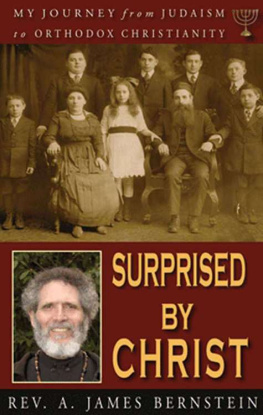
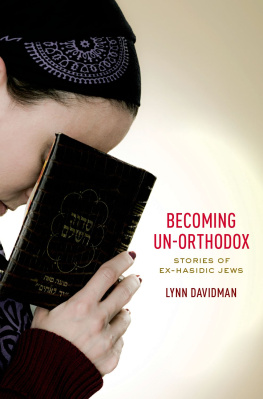
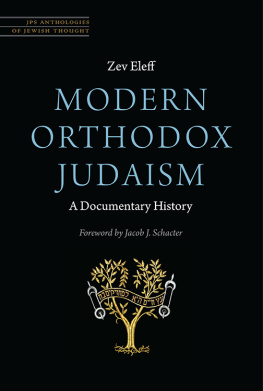
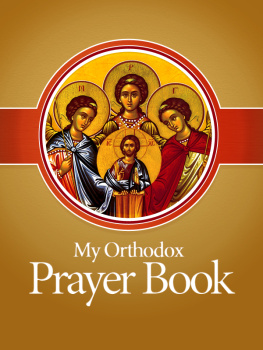
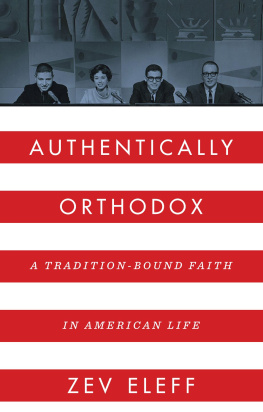
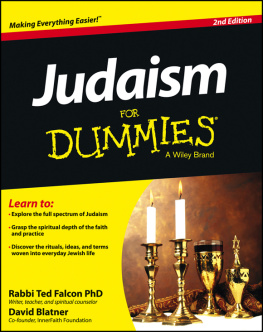


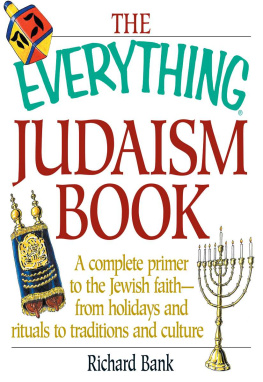

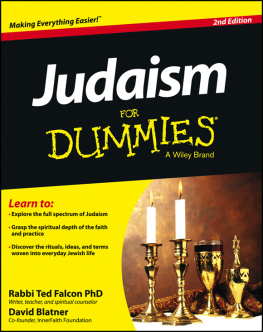

 The paper used in this publication meets the minimum requirements of American National Standard for Information SciencesPermanence of Paper for Printed Library Materials, ANSI/NISO Z39.48-1992.
The paper used in this publication meets the minimum requirements of American National Standard for Information SciencesPermanence of Paper for Printed Library Materials, ANSI/NISO Z39.48-1992.